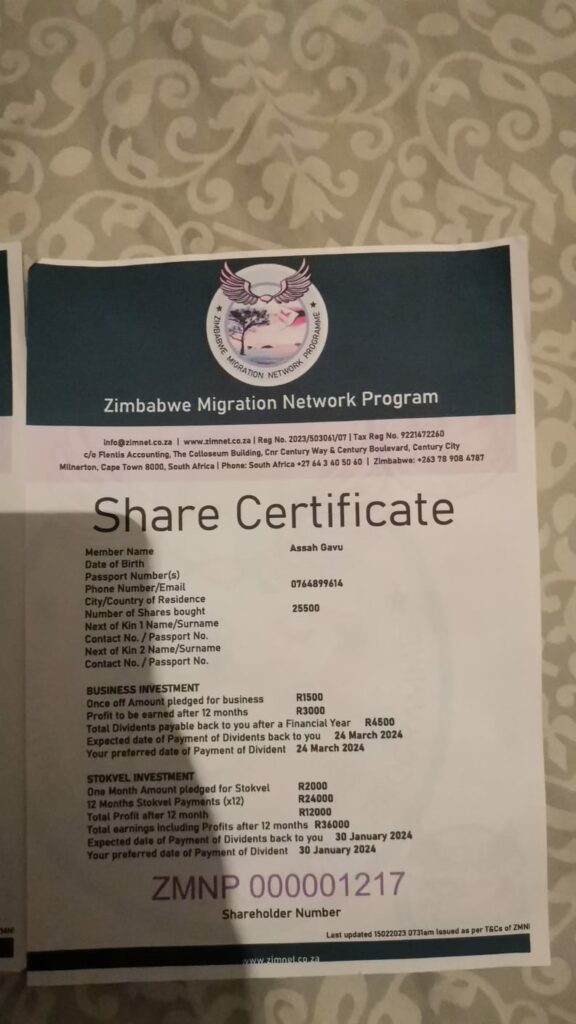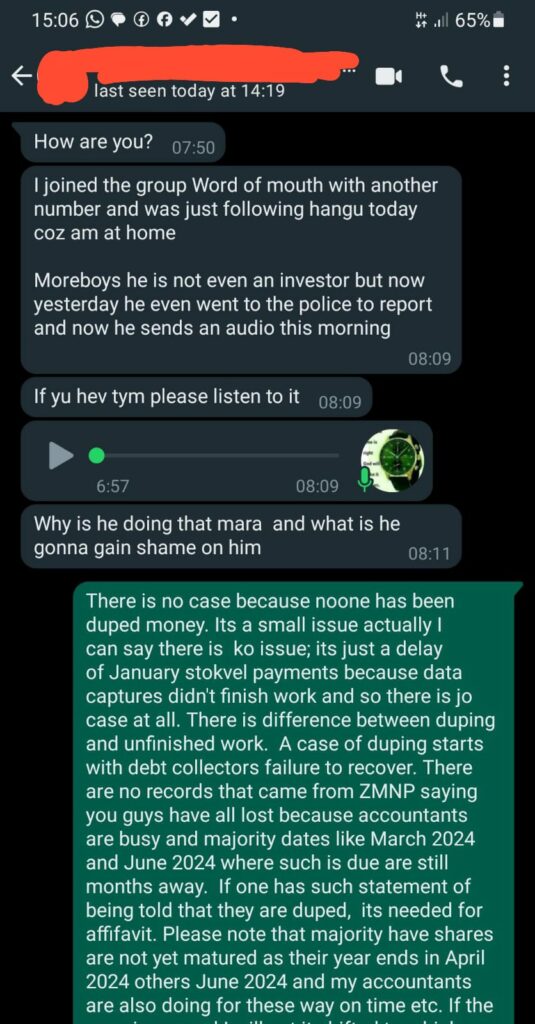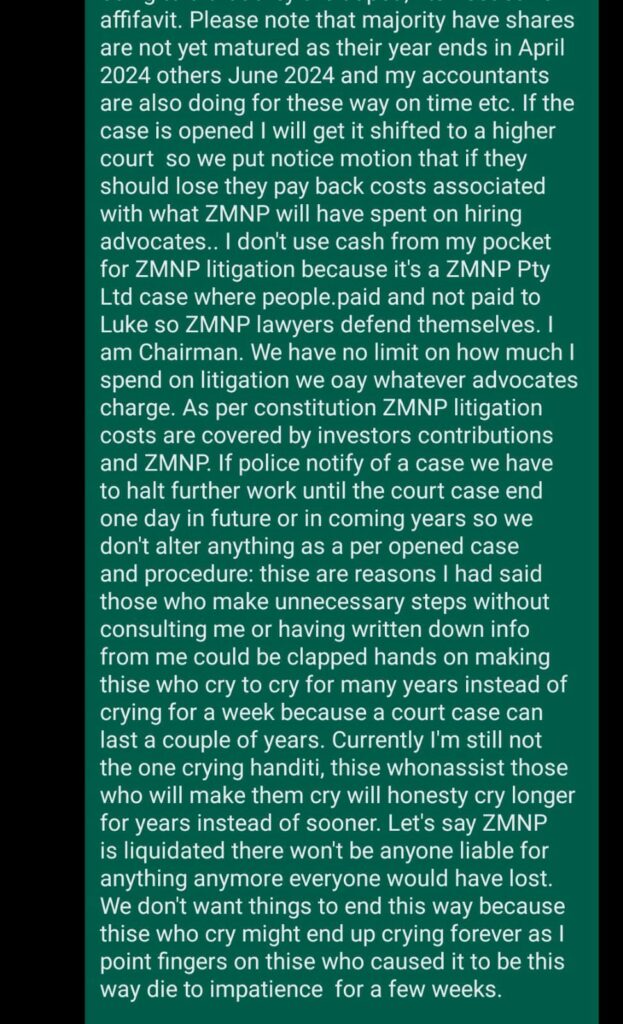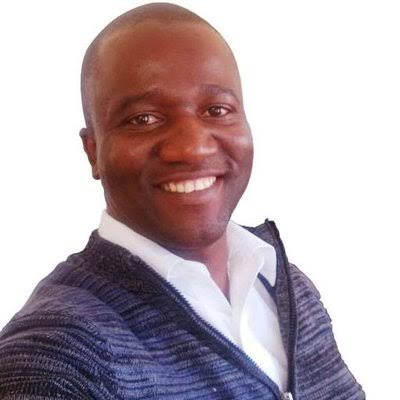As life becomes tough for Zimbabweans both at home and abroad, those in the Diaspora are becoming more vulnerable to con artists who pretend to help them make extra cash.
This comes as a migrant activist is alleged to have cheated hundreds of Zimbabweans in South Africa out of as much as R10 million and spent it on a lavish lifestyle.
Some people who spoke to CITE said this could be one of the largest fraud cases affecting members of the Diaspora.
Luke Mufaro Dzviti is alleged to have persuaded desperate Zimbabweans to invest in several projects such as a poultry business, buying a bus, and a KFC franchise. He promised that the money made from these ventures would subsequently be reinvested in other businesses like booking air and bus tickets.
Most of the people Dzviti allegedly robbed were housekeepers, gardeners, and security guards, who sacrificed their savings hoping to receive more returns and improve their lives.
Chairperson of the Zimbabwe Community in South Africa, Ngqabutho Nicholas Mabhena, said such fraud was unfortunate because it would discourage Zimbabweans in the Diaspora from pooling resources to develop their home country.
“Zimbabweans in the Diaspora will now be very sceptical when you talk of investment,” he said.
“Now there’s this scheme where people are losing money. If someone suggests pooling resources, people will say, ‘no, no, you want to eat our money.”
Mabhena said Dzviti had approached them to partner in taking the South African government to court over the non-renewal of the Zimbabwe Exemption Permits (ZEPS), but they refused.
“From the onset, we have believed in negotiations. The challenge is ZEP holders became desperate and when we told people we were negotiating they did not believe us but went to Dzviti who had set up an association to represent them.”
Dzviti was the chairman of the Zimbabwe Immigration Federation (ZIF), which advocated for Zimbabwe Exemption Permit (ZEP) holders to stay in South Africa.
ZIF, a Non-Profit Company, registered based on “group interest” had a goal of sourcing and administering legal support for ZEP holders to keep their legal resident status in South Africa when the government wanted to kick them out.
ZIF and other human rights organizations took the South African government to court over the permits and won. As a result of his advocacy for the case, Zimbabweans thought they could trust Dzviti when he suggested the idea of the profit-making projects in early 2022.
ZIF directors and the committee, however, refused as that went outside its mandate and legal parameters, arguing the organization lacked legal authority to receive funds for investment or stokvel. Dzviti then formed what is now known as the Zimbabwe Migration Network Programme (ZMNP).
Following the ZEP victory case, Dzviti opened WhatsApp groups where members discussed investing in poultry projects, KFC franchises, cross-border buses, and e-commerce. Dzviti claimed this initiative had been registered with the relevant authority, so people trusted him thinking it was not a pyramid scheme.

Mabhena said they questioned Dzviti and his organization when they asked people to donate money.
“We asked where this money will be deposited. We were told the money goes straight into our lawyer’s bank account,” Mabhena said.
“Afterwards we heard there were investment projects and this is money that Luke is said to have disappeared with.”
Dzviti’s alleged victims would then see him on WhatsApp statuses posing with millions of rands on his desk.
“We all believed in him based on the previous and current job that he was doing to fight for us in the court cases regarding our permits,” said one of his victims.
“It was with this reason that hundreds if not thousands of Zimbabweans contributed.”
A male victim who reportedly opened a police case at Sandton Police Station said Dzviti invited all Zimbabweans local and abroad to ZMNP in January 2023.
“There were two options available, including a Stokvel where individuals would pledge a certain amount that they will pay every month for 12 months,” he said.
“At the end of the new year, your money will reap three-fold interest. The Stokvel money was meant to rent or purchase a plot where we would do poultry business, and the proceeds of the chickens would finance the interest of the investors.
“The second option was a one-off pledge. These monies were meant to buy a bus, buy a KFC franchise, and do e-business such as air tickets and bus ticket bookings. The Stokvel was meant to mature on the 31st of January 2023; however, there was an option for people to apply for early payment and get paid on the 10th of December.”
The victim said the business sides were meant to mature on March 31, 2024.
“My wife and I pledged for both Stokvel and business,” he said.
“I pledged R5,000 and R2,000 for business for myself and my wife, respectively. I also pledged R2,000 and R1,500 for Stokvel paid monthly.”
He was supposed to receive R73,500, having invested R42,000 for both projects. He then notified Dzviti and his Vice Chair that he wanted an early payment on December 10, 2023, as he had plans to go to Zimbabwe.
“When I wanted my payments they started coming up with stories of audits,” he said.

His victims said Dzviti weaved stories and on December 23, 2023, he claimed in one of the WhatsApp groups that he had been robbed of R250,000 coming from Lesotho but did not provide a police case number.
Victims also said the First National Bank (FNB) account, where their savings had been stored, has been wiped with the bank advising them to “pursue this matter criminally in an attempt to recover the misappropriated funds.”
The bank stated it would assist in the process and provide the South African police with information about the implicated account.
Victims said Dzviti also swindled R5,000 from a retired South African Judge (name supplied), who had been advising him on how to deal with the permits case.
The complainants also claimed Dzviti threatened women colleagues he worked with, warning them if they revealed his location, he would leak their intimate photos.
“Luke was always surrounded by women, and he made them farm managers or secretaries,” said one of the victims.
Another female victim who invested R60,000 and wished to remain anonymous said her child missed his first day at school and had to borrow money from loan sharks.
“I am not working,” she said. “I worked as a maid for more than 15 years and did not get anything after I left the job. I then started selling in the streets to raise money; now all the money’s gone. Only God is my hope now, for men have disappointed me.”
An elderly woman now based in Zimbabwe said Dzviti “never bothers to respond” when she asked about her money.

Dzviti resigned from ZIF on February 10, 2024, and the ZIF directors wrote a letter notifying members that he had resigned because they too were unhappy.
On February 13, 2024, one of the ZIF directors (Finance), Gift Karimireni, issued a statement providing “factual” information regarding the relationship between ZIF and ZMNP so its members can seek justice for the alleged misuse of their funds.
“There have always been squabbles between Dzviti and the directors because the directors felt ZMNP was disrupting ZIF operations since the momentum had become tilted to ZMNP.”
Karimireni said ZIF is fully funded by member contributions, although Dzviti “never” shared any financial records of ZIF with either the committee or the directors, despite being asked.
Karimireni said the committee and the directors had previously raised suspicions of financial abuse but lacked sufficient evidence to prove Dzviti was misappropriating funds.
“There were members in the groups who fervently supported Dzviti to a point that he became invincible. That resulted in several committee members resigning as they felt hopeless at the time,” Karimireni said.
The affected victims had to elect an interim committee that would work on recovering their investments and any other property lost to Dzviti.
“With the help of the group’s legal advisor, it will contract lawyers who will take the case of money laundering and theft to court. We will give more updates after the committee has deliberated on the matter with the legal team on the way forward,” said the group in a WhatsApp message.
On March 10, 2024, Dzviti announced an organization called Africa Immigration Programme, calling on citizens from Malawi, Lesotho, Nigeria, Ethiopia, Congo, Swaziland, Ghana, and other marginalized citizens from all 52 states of Africa, saying it would be shown on the main news.
He claimed to have found donors for the services and mandates offered at Africa Immigration Programme, who would be taking care of their court expenses and all other internal expenses. He even warned people that “No one on our platforms is allowed to inbox you charging money for anything.”
Some of his victims went livid, saying, “He has the nerve to do a public address on permits but nothing on people’s millions that he’s owing.”
Contacted for comment, Dzviti said he was running legitimate businesses and that 90 percent of the investments went into farm infrastructure, while the remainder is subject to be taxed.
“I was running a very good chicken project on behalf of Zimbabweans,” he said and claimed that last year’s avian flu cost them.
“Sometime around February 5, we had a whole month of sanitizing to combat bad flu as chemicals must be used for 30 days. I decided to visit Zimbabwe for some days. Someone said I ran away, but I was available every day. On my return to South Africa, the investors elected a committee which had taken over the Walkerville Infrastructure, which is in their hands now.
“The infrastructure they have is where their money was invested. So if someone says I ran away with money, did the infrastructure they have, which costs R1.5 million, fall from the sky or happen for free? They forget we also paid labour to do it. This huge infrastructure is under Bhekinkosi Ncube at 215 Forst Road, Walkerville, Johannesburg.”
Dzviti said if the members “want their money back honestly they should seek the services of a liquidator and sell their assets and get back their money.”
“South African laws say one cannot pay people without paying tax, which is why I engaged auditors in Rosebank in March. I have to pay the auditors R47,000,” he said, adding he has not paid tax because the auditors are still busy.
“This was a controversial thing. We are very late; everything is in tatters.”
Dzviti also claimed that there was no police case, otherwise he would have been issued with a warrant of arrest.
“The police report is civil because this is not criminal in nature.”
Gauteng police spokesperson Lt-Col Mavela Masondo in South Africa said there was no such case.
National Police Spokesperson, Commissioner Paul Nyathi, said it needed to be established if these Zimbabweans had made a report in South Africa.
“If they did, then South African authorities can then utilize Interpol structures there in South Africa. As long as there is credible information that the suspect is in Zimbabwe, this person can be arrested and I can assure you due processes of the law will be followed. This person will be extradited to South Africa to face justice,” he said.
Comm. Nyathi said Zimbabweans needed advice on how they can approach South African authorities to find out if Interpol has been engaged or not.

